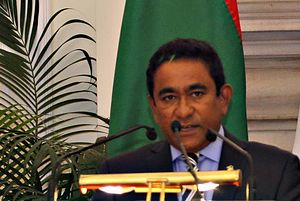Abdulla Yameen, the nominally outgoing president of the Maldives, is making a last-ditch effort to hang on to power. After conceding defeat in the aftermath of the September 23 elections that gave Ibrahim “Ibu” Mohamed Solih, the opposition’s candidate, a clear victory, Yameen is now alleging that the election result was illegitimate.
Yameen’s move thrust the archipelagic Indian Ocean state, where democracy had come under considerable strain in recent years, into a new political crisis. Yameen was slated to yield power to Solih on November 17, the date of the presidential transition.
On Sunday, judges in the Maldives entertained a petition filed by Yameen requesting that the election result be annulled. Yameen’s case against the resulted cited vote-rigging and obstructions preventing the participation of voters. Turnout in the election was extremely high at 89.2 percent, according to the official Election Commission data.
The day before the hearing, Yameen’s Progressive Party released a statement condemning the election as the “most farcical election in living memory,” citing “abysmal” organization. Yameen’s lawyer, Mohamed Saleem, alleged that a conspiracy had been put into place to tamper with ballots such that those marked with Yameen’s name saw the ink disappear. There was no evidence provided to support these claims.
Yameen’s move has put an end to the short-lived relief that took place in India, the United States, and elsewhere after his defeat. Under his presidency, democratic institutions came under assault and the opposition was systematically harassed. Former President Mohamed Nasheed, the Maldives’ first democratically elected leader, was imprisoned by Yameen in 2015, beginning a broader democratic backsliding. Earlier this year, Yameen declared a state of emergency as well.
Yameen’s legal challenge to the election result has drawn criticism. “The U.S. is concerned by troubling actions by outgoing President Yameen that threaten to undermine the will of the Maldivian people, and will consider appropriate measures against anyone who undermines a peaceful transfer of power in the Maldives,” Robert Palladino, a spokesperson for the U.S. Department of State, said last week.
“The United States and the international community would view with great concern any attempt that undermines the democratic process including any delay in the inauguration scheduled for November 17.”
The Indian Ministry of External Affairs, which released a statement congratulating Solih prior to the release of official Election Commission results on the day of the election, has yet to release a statement on Yameen’s challenge. New Delhi’s traditionally close relationship with Malé grew strained as Yameen pulled the Maldives toward China.
It remains to be seen if Yameen’s efforts can succeed, but any sign that they might would likely precipitate longer term instability given the support won by the opposition in the election. It’s unlikely that Yameen will find support from overseas given that most of the international community — including China — congratulated Solih on his victory and accepted the results of the election.

































